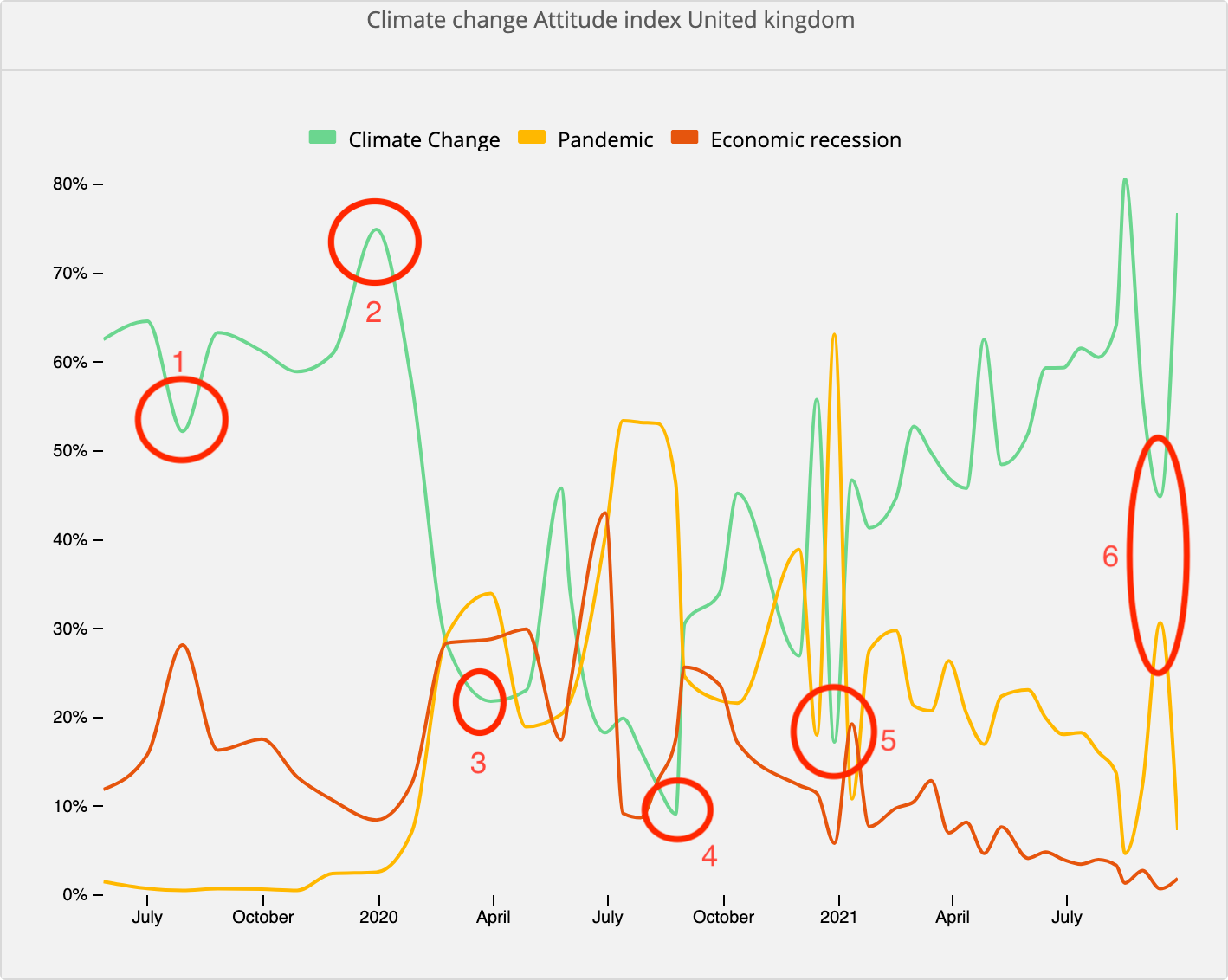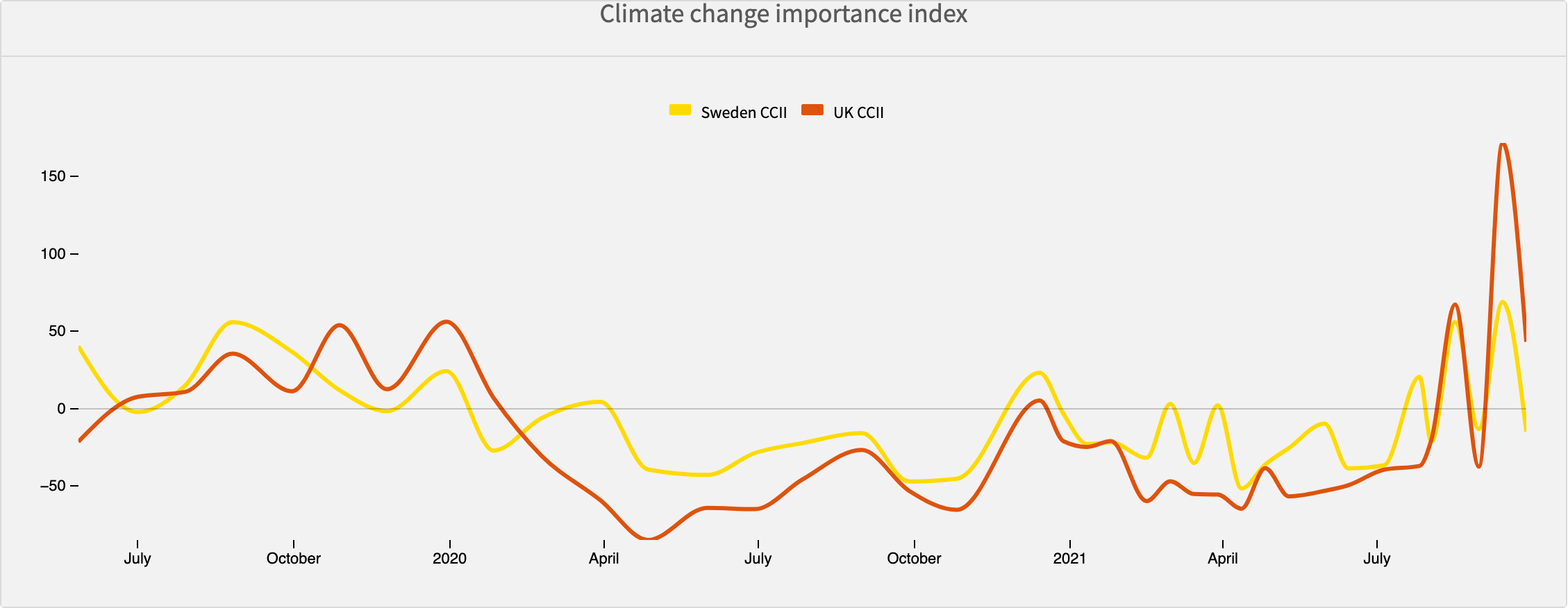COP26 reflects our inner quandary – it’s us or the climate

Media Leaders
Search data shows we all want to save the planet, so long as we’re not worried about our health and the economy.
The word is holding its breath to see if world leaders can agree binding commitments to limit global warming at the end of the COP26 summit this week. The mood music coming from Glasgow so far is not overly reassuring with commentators and campaigners giving a lukewarm welcome to the scale and timelines of the major promises made so far.
A possible reason why there is not been much to cheer about so far is that politicians could just be a little more like the rest of us than we care to imagine. As individuals, we all talk a good game on the environment but when the chips are down, we all face the same binary decision of what to worry about – the things that affect us directly today or those bigger issues that are somewhat down the road.
We can worry about our health and wealth or the climate emergency, we cannot worry about both at the same time.
This might sound harsh, but the data backs it up.
If we look beyond virtue signalling in social media and press releases to examine the data behind our search patterns, we clearly see the public’s self-professed devotion to green causes is a lot more fickle than we might like to think.
We may have talked about clear skies and fresher urban air during lockdown, but when we search in private, a very clear symbiotic relationship between worrying about ourselves or the environment becomes clear.
That makes convincing world leaders to sign up to challenging, binding agreements on global warming a particularly tough challenge when fears of high infection rates and the potential for recession are running high.
Search data lays bare the challenge, but it also shows public feeling in the host of COP26 might have taken a major turn in right direction just in time for the landmark meeting.
Pandemic or climate – you can’t worry about both

The symbiotic dance between the pandemic and recession on one hand and worries concern over climate change on the other can be picked up as early as the summer before Brexit (1). With so much uncertainty about the eventual deal, fears of a recession rise sharply with a mirror-image drop in concern for the environment.
This sets the tone for Brexit day on the 1st of January 2020 (2). Fear of recession shoots up again, as does concern for the pandemic which, at that stage, was focussed on the prospect it might be brought in by travellers from China. At the same time, concern for climate change drops off a cliff as worries about recession and a looming pandemic dominate the public’s thinking.
These fears dominate during the first lockdown (3) until the UK was released in the summer of 2020 (4). Then, and only then, fears for our health and wealth subside and the British public shows signs of worrying more about the climate once again.
Further proof that we prioritise worrying about either our own issues or the environment comes during the second lockdown and straight afterwards. At the start of 2021, although the country is in lockdown, the UK begins the roll out of vaccines and so concern about the pandemic drops, as do fears of recession, after an initial spike, as government support for companies and workers is maintained.
So, people are generally less concerned about the pandemic and their finances second time around. They can go back to worrying about the environment, particularly when “Freedom Day” of 19 July ends restrictions.
However, within a couple of months, this jubilation is soon forgotten when infection rates shoot up when schools and colleges reconvene after the summer break and many offices begin to reopen.
The immediate impact of high caseloads in September, is instant (6). The public’s concern about the pandemic soars as their eye on climate change subsides. It’s only momentary, but it shows the symbiotic relationship between concern for the things that affect us personally, through our health and wealth, and a global cause most people support.
Greta Thunberg’s homeland is not immune
This is not just a UK phenomenon. It is clearly visible when the data for Sweden is examined. Greta Thunberg is a hero of the environmental movement but even her home country shows a downward trend for how important climate change is for people. The downward trend begins at the start of 2020 when pandemic issues spread concern throughout Europe.

We can see this take hold in the Spring of 2020 when the country, still resisting a full lockdown, shut down schools and colleges and enforced social distancing in hospitality venues with a warning to the elderly to stay at home.
Climate change concern rises again when the country joined in the shared optimism towards the end of 2020 when most of Europe was once again enjoying having heir restored. The moment the winter of 2020-21 is upon us, much of Europe is returned to lockdown and Swedes’ concern for climate change take a dip from which it has so far yet to recover.
Lessons for politicians and brands
The data speaks for itself in Sweden, just as it does in the UK. When people are concerned about their own health and wealth they care a little less about climate change, and vice versa.
It is a vital takeout for brands queuing up to aligning themselves with the environmental causes being championed at COP26.
People are environmentally aware and they do want to make a difference, but those messages of brand purpose resonate at their best when pandemic and recessionary fears have quietened down. If the deputy chief medical officer, Jonathan Van Tam, is correct, this will be by the Spring of 2022.
As for the final declaration to be made at the end of COP22, in the absence of China and Russia, the public will need to remember politicians represent countries which have millions of people just like us.
The world will have to hope, then, that concern over the pandemic and the possibility of recession is now abated far enough for the momentum behind climate change to win the day.
The key could well be that very large uptick in climate change concern recorded in the month before the Glasgow Conference.
If the UK’s general feeling is shared by world leaders, it could be a happy ending to two weeks which have so far yet to meet the expectations of the assembled press pack and environmental campaigners.
Frederique Pirenne is co-founder and chief science officer at share of search company My Telescope



